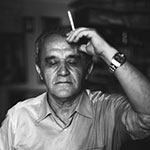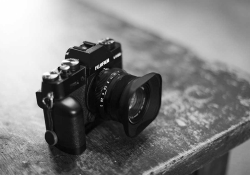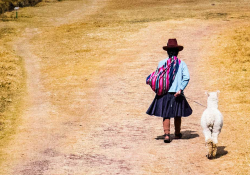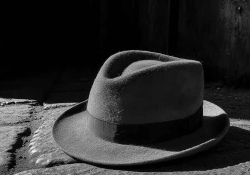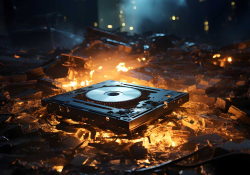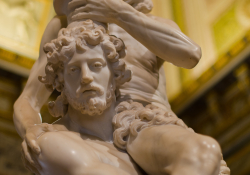Three Scenes: April 6, 1939
 Despite a purported alliance with Albania’s King Zog, who had been in power since 1922, Mussolini invaded Albania on April 7, 1939. Here, Albanian writer Moikom Zeqo (1949–2020) reimagines the prelude to invasion, when power-hungry politicians, religious leaders, and ego-driven intellectuals colluded with fascism.
Despite a purported alliance with Albania’s King Zog, who had been in power since 1922, Mussolini invaded Albania on April 7, 1939. Here, Albanian writer Moikom Zeqo (1949–2020) reimagines the prelude to invasion, when power-hungry politicians, religious leaders, and ego-driven intellectuals colluded with fascism.
More than a hundred Caprioni bombers took off from the runways of Bari and Puglia and, sometime after dawn, entered the Albanian sky. Thus, it was the sky that was attacked first—a prelude to the invasion. These lines of planes were the shifting borders of empire. Borders that demanded the ancient rights of Rome—though in fact such rights were just an assertion of absolute power.
The planes circled over Durrës—swarms of flying devils, whistling death. The residents hid in their basements to escape the bombs—but then, mysteriously, no bombs fell. People reemerged into the streets and, with their hands to their foreheads, gazed at the airplanes tearing up the sky. Death’s open talons seemed reluctant to close. And then the planes suddenly left the coast and headed inland toward Tirana. After a few minutes they reappeared over the horizon, which was undefended.
The earth, in contrast, had its defenders. And it would no longer be deceived.
Some random gunshots. A few of the citizens, the most impatient ones, were shooting at the planes with rifles. Then silence again fell upon the city. This silence was like someone withdrawing his arms at the last moment to preserve strength.
The south wind blew across the sea, which looked uniquely blue. Peace reigned out there on the water. Nothing could be seen on its surface; the sea still maintained its neutrality. It had not yet participated in the day’s events. The sky was a different story.
The city was red-eyed from sleeplessness, nervous and buzzing.
These lines of planes were the shifting borders of empire. The city was red-eyed from sleeplessness, nervous and buzzing.
People who never bothered to read the papers or follow current events had suddenly changed their tune: they were intensely interested in everything. The most astonishing news spread from one resident to another.
In the central square at 9:15 a.m., two young men burned copies of the morning’s newspapers.
Others joined them. Soon, all across the square, small fires could be seen rising from people’s nervous hands.
Printed on the front page: “Foreign journalists and other unscrupulous people have recently spread tendentious stories about Albania and its relationship with Italy. There is no doubt that the purpose of these stories is to present distortions about the excellent relationship between our two countries.”
From his office on the second floor of City Hall, the mayor of Durrës could see the blips of fire in the central square.
At last, he thought, they understand—which is more terrifying than anything. Now it’s finally clear what has been happening. The people will never forgive them. The people will avenge the fact that the truth has been withheld.
He pursed his lips in disdain. “Those . . . scumbags.”
On the wall of his office, above his desk, was a portrait of the king. Exhausted, and haggard as a ghost, the mayor gazed up at the portrait.
It’s over, he thought dully. The decorative golden frame would remain, though the portrait would be replaced. History is a frame; only the portraits change—a game of images, like cards, or else a game in which the living die and disappear inside an eternal geometric quadrangle.
History is a frame; only the portraits change—a game of images, like cards, or else a game in which the living die and disappear inside an eternal geometric quadrangle.
He tried to recall the most beautiful moments of the short-lived Kingdom of Albania. For some reason he envisioned a banquet where, seated among the guests, he kept blabbering on and on.
This banquet had recurred in his dreams over the years, and so it had colonized his memory. The mayor couldn’t remember which particular banquet it might have been, or where it occurred, or who had thrown it. He had been to hundreds of banquets, but this dream banquet was elusive; still, he kept trying to identify it.
“What can be done?” the mayor asked himself. But then—right then—he knew exactly what he had to do.
“I must be invited to the banquet again. That’s all.”
Then the ghostly banquet appeared before him, suddenly real, materialized. In the middle of the table was a large platter, on it the roasted body of the Albanian king. And the mayor felt an unbearable hunger . . .
* * *
Two hundred and fifty meters from City Hall, the Catholic church of Durrës was architecturally significant. Inside the church, there was an eerie calm as the priest stood before the golden altar. Hanging crucified above, Christ watched him slyly through half-closed eyes.
“They’ll come,” the priest said to himself. His elegant, clean-shaven face looked more youthful than he actually was. “But on which day?” he asked. Their arrival right before Easter would be symbolic and powerful. The priest had asked his deacons to distribute leaflets throughout the city for the Easter celebration, which needed to be as magnificent as possible—and he had done everything he could to make it so. With ecclesiastical flags embroidered in gold, with icons and heavy, burning candles, and with the nailed sculpture of the crucified Christ—which he himself would carry—the religious procession would pass through the streets singing Miserere and De Profundis in Latin. It would end at the church for Good Friday mass, where they would hold the traditional lamentation for Christ’s death and prayers for his resurrection.
The priest would sing the Psalm of Lamentation, swinging the censer solemnly. And they would come, those soldiers of Christ, they would take oil and drink wine, shouting, “Hurrah, hurrah, Albania is dead, Christ is risen!” Incense smoke would pour from the muzzles of their cannons.
Incense smoke would pour from the muzzles of their cannons. The cross had needed to become the sword it had always resembled.
The priest put his face in his hands. He tried to concentrate, avoiding the altar’s gaze.
No resistance—it must be eliminated, thought the priest. Flowers, not guns. I pray the city won’t resist.
A year ago, he had hosted an apostolic delegate of the Vatican—the pope’s all-powerful envoy in Albania—until the delegate had been transferred to Spain, where the Inquisition had originated and still maintained a tradition. The popular uprising had been like a mine planted beneath the foundation of Spain’s steadfast Catholicism. Eliminating the opposition had become essential. For a lasting peace, the cross had needed to become the sword it had always resembled—then eventually it could return to the form of the cross again. Catholicism and fascism were Franco’s two bloody hands.
The apostolic delegate had commemorated Franco’s victory with a great mass—an unprecedented ceremony, a celebration of the triumph of the Holy Inquisition. Baptismal water was scattered across the corpses of the dead—as, of course, was a lot of champagne for the Catholic, fascist heroes.
The priest considered the relationship between Albania and Spain. The fascist victory in Spain had set the conditions for a coming triumph in Albania. Iberia and the Balkans had become united in one auto-da-fé—the burning flames lit by generals and cardinals.
The priest thought of flowers. So many flowers grow in Albania!—an almost unparalleled flourishing.
Suddenly feeling as if he were caught in a trap, the kneeling cleric asked himself, “And for the soldiers’ arrival, will there indeed be flowers?” A church organ would roar—but instead of keys, the triggers of guns would be pressed. In the end, this was the only way to spread religion to this semisecularized country of infidels.
The priest again looked up at the cross above the altar. And for the hundredth time this morning, the half-closed eyes of the martyr sneered at him slyly.
* * *
Late in the evening of April 6, 1939, Qazim N., a journalist who had studied in Italy—as well as an agent recruited by the OVRA—was in his room sitting at his typewriter.[i] Beside the machine was a stack of typed pages. A half-filled sheet of paper was still in the carriage. This was the final page of his translation, from Italian into Albanian, of Mussolini’s book The Doctrine of Fascism.
It’s finished, he thought. He was overwhelmed by a feeling of pride. The moment was coming when the book would be published. Just four or five days more and he would go to the state printing office with his translated manuscript under his arm. He’d known how to stay focused; he was pleased with his wit, knowledge, and perseverance. He would wave the book in front of everyone, widen the eyes of the envious. He would mock those eyes that said, “Oh, why didn’t we think of it? We also know Italian. Why didn’t we think of it?” His picture would be taken; he would give triumphant speeches, write reviews and articles. Fascism would be the future of the world—the only sufficient version of civilization. The Romans would dominate everything. They would come again to Albania to civilize its people, which had yet to produce such a great figure as Mussolini. Rome had been the capital of Christianity for centuries—truly a world city. But this book he had translated was more important than all the papal bulls and encyclicals—it was a new gospel of the world and its evolution, preparing and constructing a new kind of religion. Mussolini was Christ, the Messiah prophesized in the ancient books, in the visions of sibyls and soothsayers. He had finally arrived into the world, this political Messiah of the fascist revolution.
He had finally arrived into the world, this political Messiah of the fascist revolution.
Qazim N. saw his own pale face in the mirror, as if in a dream or a fairy tale. And he suddenly felt different. He was being reborn with the features of his idol. He was Mussolini himself!—alive and in motion.
He sighed happily. He tried to imagine his friends—including the grotesque priest of Durrës. All of them had prepared for this long-awaited day. On many evenings they’d visited the Italian consulate to perform humble gestures of social delicacy—always affirming, always happy to exhibit in various ways the servility that might eventually gain them some future post. The Italian consul Baron Aloisi received all kinds of information from them; they talked and talked and talked. This was how they had served their small, long-suffering homeland, whose future would be brilliantly determined at last from across the sea.
But that’s all they could do—they’re not capable of more, Qazim thought with disdain, standing at the window. They were incapable of great spiritual revolutions, having been overcome merely by profit-making pragmatism. They didn’t want to understand the true philosophy, the true soul of a fascist civilization. They identified fascism only with goods and posts. If these would be provided to them by India they would obey that country as well.
But he was different. It was not for nothing that Giovanni Giro had kept him close. It was not for nothing that Giovanni—personal friend of Jacomoni—had always supported him, had introduced him to the OVRA.
The translated book lay on the table. Looking at the first page, Qazim suddenly realized he needed a dedication. Of course! That would make a strong impression.
He bent over the white paper and wrote, almost wistfully: To the glory of Mussolini—my great teacher, our century’s soldier and philosopher, the rebirth of humanity, and the strength of the world. It seemed a bit long, perhaps, but it said what he wanted.
Meanwhile, while it was midnight in Durrës, a few hundred kilometers to the west 100,000 soldiers were mustering and preparing, and war materiel had already been distributed to the ports of Bari, Brindisi, and Taranto.
Death was putting on its brutal, merciless mask.
Durrës, 1973
Translation from the Albanian
[i] The OVRA were the fascist-era Italian secret police.
